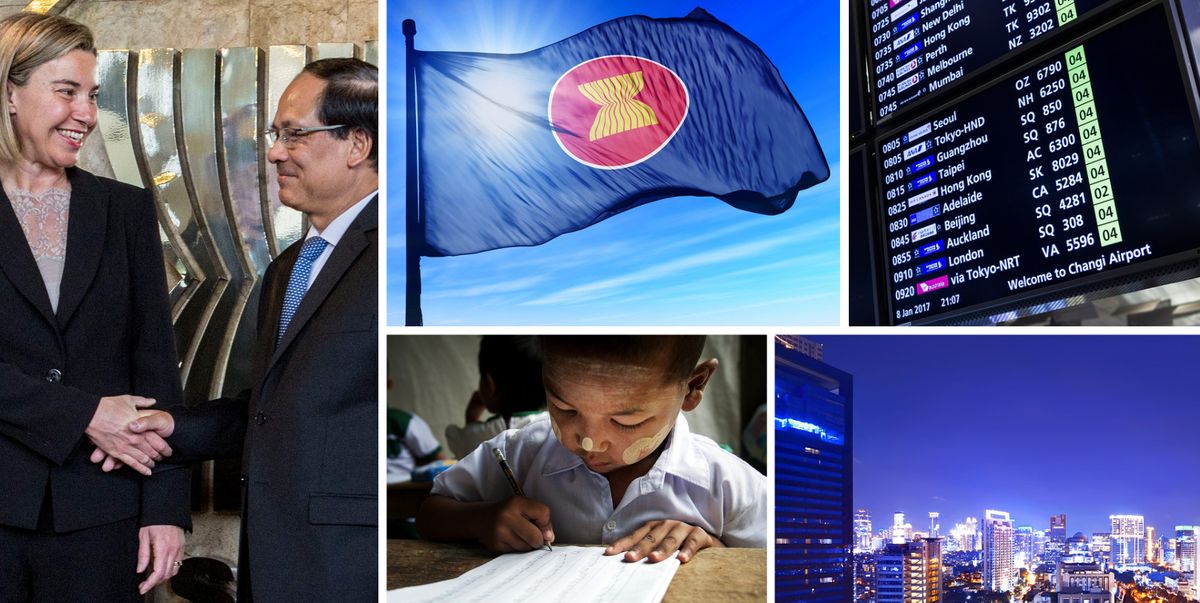
Summary
EU, ASEAN SHOULD STRENGTHEN TIES AS GLOBALISATION WEAKENS
Both sides call for closer relations at Friends of Europe debate
The EU and ASEAN should react to the worldwide retreat from globalisation by boosting their efforts towards greater partnership, participants told a Friends of Europe Policy Summit.
The Association of South East Asian Nations was set up in 1967 at a time of global turmoil to promote greater political and economic cooperation. The past few decades have provided its members with a strong framework for economic growth, in particular the trend towards global free trade. As ASEAN reaches age 50, however, there are signs of a backlash against globalisation in Europe and the United States.
“The world is turning inward now and multilateralism seems to be under pressure,” said Surin Pitsuwan, who was ASEAN Secretary General from 2008 to 2012. “We are having to look for a new modality in Southeast Asia. If you ask me, the answer should be more ASEAN – more economic partnership – because we can’t rely on what is happening around the world.”
The EU could contribute to ASEAN economic growth too. ASEAN is the EU’s third largest trading partner and the EU is ASEAN’s second, with bilateral trade reaching €201bn in 2015.
“The economic relationship remains the bedrock of our relations,” said Gunnar Wiegand, Managing Director for Asia and the Pacific at the European External Action Service (EEAS). “We have had a very proactive trade agenda, and already negotiated free trade agreements with Vietnam and Singapore.”
The two partners have launched negotiations for a comprehensive air transport agreement, which would be the first accord to lay out an “open skies” or “open aviation area” arrangement between two major regional trading blocs. In addition, on 10 March, trade leaders from the blocs, including EU Commissioner Cecilia Malmström, announced the resumption of work towards a region-to-region FTA.
“Market signals are very positive,” said Pierre Amilhat, Director for Asia, Central Asia, the Middle East and Gulf and the Pacific at the European Commission Directorate General for International Cooperation and Development. “They are validating the partnership, as is civil society.”
Efforts to boost economic integration between ASEAN members include work to develop the ASEAN Economic Community (AEC), which will promote free trade and the flow of skilled labour.
“The AEC has already achieved one part of its agenda – to reduce tariffs and grow trade in goods,” said Ong Keng Yong, Executive Deputy Chairman of the S. Rajaratnam School of International Studies, who was Secretary General of ASEAN from 2003 to 2007. “ASEAN economies have become dynamic from the flow of goods. The main problem today is the trade in services, which is not growing as strongly as we would like. There are non-tariff barriers that slow down trade in services.”

Event recording
ASEAN at fifty – Living in a challenging world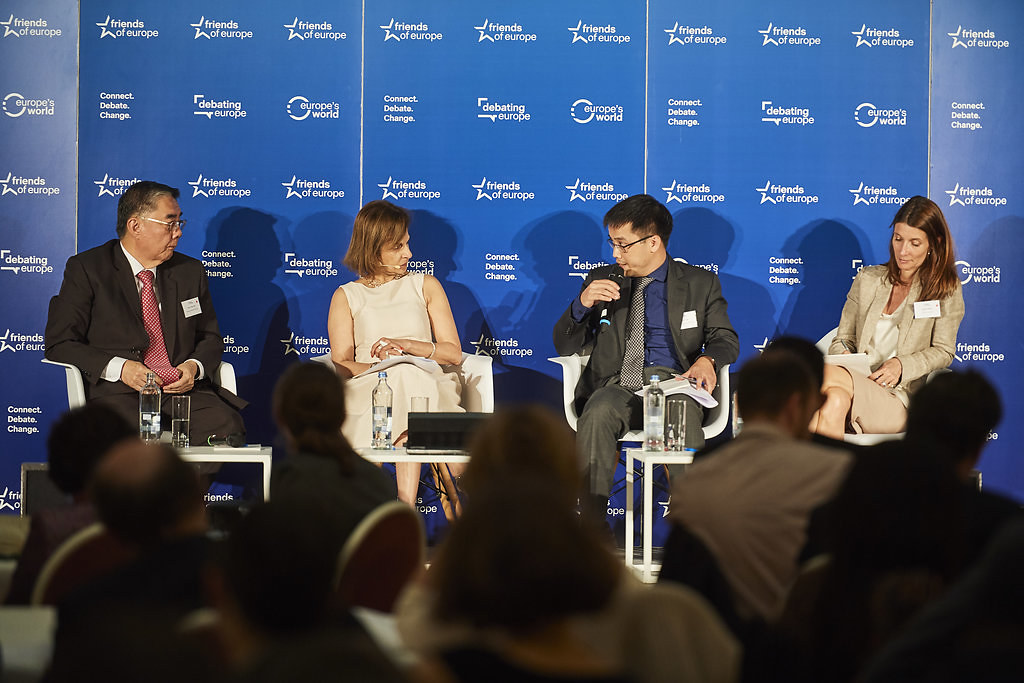 Should you not be able to see the photo gallery, please click here.
Should you not be able to see the photo gallery, please click here.
About
2017 promises to be a crucial year for the Association of Southeast Asian Nations (ASEAN) as it gears up to celebrate its 50th anniversary. EU-ASEAN relations will also move further up both regions’ agenda as they prepare to celebrate 40 years of diplomatic relations and continue efforts to elevate their partnership to a strategic level.
ASEAN’s 50th anniversary should be a time to celebrate the organisation’s many achievements and progress, including work being done to establish the ASEAN Economic Community (AEC). Southeast Asia’s economic performance puts it among the world’s rising economic stars. With a $2.4tn GDP when taken together, the McKinsey Global Institute estimates that the region is already the seventh largest economy in the world and by 2050, it will be the fifth largest.
EU-ASEAN trade and investment relations have been growing accordingly: ASEAN now represents the EU’s third largest trading partner, with bilateral trade having reached €201bn in 2015. The two partners have put connectivity at the centre of their trade and investment relations, and have launched negotiations for a Comprehensive Air Transport Agreement (CATA), which would be the first accord to lay out an “open skies” or “open aviation area” arrangement between two major regional trading blocs. In addition, the announcement on Friday 10 March 2017 that work towards a region-to-region free trade agreement was to resume is breathing new life into the relationship.
The milestones for ASEAN and EU-ASEAN relations provide leaders of both regions with the opportunity to craft a new forward-looking strategy for the future development of their strategic partnership. Friends of Europe’s high-level policy summit will analyse opportunities and challenges ahead for ASEAN and EU-ASEAN relations.
Related content:
- Friends of Europe: EU-ASEAN: Sharing experiences on education and regional integration, by Shada Islam
- Europe’s World: Will troubled waters spoil ASEAN’s celebrations? by Yeo Lay Hwee
IMAGE CREDIT: CC / Flickr—United Nations Photo; leolintang/Bigstock.com; Flickr—EEAS; Flogel/Bigstock.com; nawadoln/Bigstock.com
Schedule
Rapid geopolitical changes pose a challenge for both Europe and Asia. EU celebrations of the 60th anniversary of the signing of the Treaty of Rome came only days before Britain formally notified its decision to leave the Union. The Association of Southeast Asian Nations (ASEAN) will be 50 years old in August this year and has certainly come a long way in ensuring peace and stability in the Asia-Pacific while also pushing ahead with efforts at building an ASEAN Economic Community (AEC). Both Europe and Asia, however, have to adapt to changing global dynamics including continuing uncertainty over the future direction of US policy in Asia and the emergence of a more pro-active and self-confident China.
- How is ASEAN coping with the many “unknowns” of the new US Administration’s policies towards Asia and conflicting Sino-American interests and rivalries?
- Given changed global geopolitics, can Europe become a more important political and security partner for ASEAN?
- Can ASEAN continue to ensure its “centrality” in a stable regional security architecture in the Asia-Pacific?
- What are the key achievements of ASEAN and the key challenges it faces as it turns fifty?
- How are Europe and ASEAN tackling the specific problems of ASEAN sub-regions like the Mekong Delta?
Speakers
Pierre Amilhat
Director for Asia, Central Asia, Middle East/Gulf and Pacific at the European Commission Directorate General for International Cooperation and Development
Delia Domingo-Albert
Former Foreign Affairs Minister of the Philippines
Surin Pitsuwan
Secretary General of the Association of Southeast Asian Nations (2008-2012)
Wiryono Sastrohandoyo
Member of the Board of Trustees of the Centre for Strategic and International Studies Foundation, Indonesia
Gunnar Wiegand
Managing Director for Asia and Pacific at the European External Action Service (EEAS)
Moderator
Shada Islam
Managing Director at New Horizons Project
SESSION II: Globalisation – winners and losers
Almost three decades of globalisation have changed both Europe and Asia, creating both winners and losers – people who can adjust to domestic and international competition, and those who lag behind relatively. ASEAN for instance has seen a massive increase in its urban middle class. But with many still living in poverty, the region must also move fast to implement many of the Sustainable Development Goals (SDGs) covered by Agenda 2030, including those related to women and children. Meanwhile, efforts to build stronger people-to-people ties across ASEAN and between the EU and ASEAN remain important, including through programmes such as Erasmus+ and SHARE.
- Who are the main winners of globalisation in ASEAN and what can be done to help those who have not benefitted from economic liberalisation and openness?
- How is the growing urban middle class impacting on ASEAN’s economic, political and societal landscape?
- Which parts of Agenda 2030 are especially relevant to meeting ASEAN’s developmental challenges and how can they be implemented?
- How successful has the group been in creating a common identity and stronger bonds between citizens?
- What progress has been made so far in encouraging people-to-people contacts, particularly among young people?
Speakers
Reinhard Bütikofer
Member of the European Parliament and Rapporteur on EU-ASEAN relations
Chem Srey Oeun
2016 Young Southeast Asian Leader and Research Manager at Kantar TNS Cambodia
Jean-Pierre Lehmann
Professor Emeritus of International Political Economy at IMD
Ma Thida
Surgeon, writer, human rights activist and former prisoner of conscience, Myanmar
Yuyun Wahyuningrum
Senior Advisor on ASEAN and Human Rights at the Human Rights Working Group, Indonesia
Moderator
Shada Islam
Managing Director at New Horizons Project
Fourty years after they established official diplomatic ties, economic relations between the two regional groupings are forging ahead. With bilateral trade reaching €201bn in 2015, the EU has become ASEAN’s biggest trading partner after China, and ASEAN now represents the EU’s third largest trading partner. Efforts to drive regional economic integration and create an ASEAN Economic Community (AEC) and ASEAN Connectivity Master Plan are increasingly attracting European businesses to invest in the region, accounting for 21.5% of total FDI flows. Meanwhile, uncertainties over the future of the Trans-Pacific Partnership following the US decision to withdraw from the trade pact have given added impetus to other trade initiatives including the Regional Comprehensive Economic Partnership (RCEP) trade agreement and negotiation of an EU-ASEAN FTA.
- How does the EU-ASEAN relationship compare with ASEAN’s economic and diplomatic ties with other global players, including the US, Australia, China and Japan?
- What are the experiences with the different bilateral FTAs between the EU and ASEAN member states and what are the perspectives for a region-to-region FTA?
- Are European business leaders seizing the economic opportunities offered by the ASEAN Economic Community and the connectivity initiatives, including in the digital sector?
- Are ASEAN countries doing enough to create an economic environment which is attractive for European investors?
- With more than 11 million people travelling each year between the two regions, what impact would a Comprehensive Air Travel Agreement (CATA) have on tourism and connectivity among people?
Speakers
Helena König
Director for Asia and Latin America at the European Commission Directorate General for Trade
Ong Keng Yong
Executive Deputy Chairman of the S. Rajaratnam School of International Studies and Secretary General of the Association of Southeast Asian Nations (2003-2007)
Dau Anh Tuan
Director-General of the Legal Department at the Vietnam Chamber of Commerce and Industry (VCCI)
Moderator
Shada Islam
Managing Director at New Horizons Project
Speakers
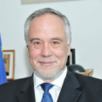
Director for Asia, Central Asia, Middle East/Gulf and Pacific at the European Commission Directorate General for International Cooperation and Development
Pierre Amilhat is responsible for the European Commission’s cooperation and development programmes across Asia, the Middle East and Gulf, and the Pacific. He has spoken on a number of occasions about EU-China relations in terms of green growth along the Belt and Road route, as well as trade and investment between the two. With more than 20 years of experience in the Commission, Amilhat has previously worked in maritime affairs and fisheries, external relations and trade, and has also served in the EU Delegation to Vietnam.
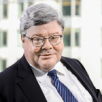
Member of the European Parliament and Rapporteur on EU-ASEAN relations
As rapporteur of the latest European Parliament report on EU political relations with ASEAN, as well as a part of the European Parliament delegation for relations with the countries of Southeast Asia and ASEAN, Reinhard Bütikofer has a deep understanding and expertise of the region. Bütikofer travels frequently to Southeast Asia, not only to promote stronger ties with the European Union but also to support and bolster trade and investment. Bütikofer is a strong advocate for peace within the region, including for the resolution of disputes in the South China Sea.

2016 Young Southeast Asian Leader and Research Manager at Kantar TNS Cambodia
Chem Srey Oeun is a researcher at Kantar TNS Cambodia, one of the world’s leading data, insight and consultancy companies, where she has led work on young people, elections and democracy, gender and other social issues. She is the author of the report “Cambodian Millennial Trends”, which analyses the consumer habits of young Cambodians. She was nominated in the Young Southeast Asian Leaders Initiative (YSEALI) in 2016, the US programme to connect young leaders from ASEAN countries. Before joining Kantar TNS, she worked for Australian Volunteers International, a not-for-profit organisation promoting economic and social development across Asia and the Pacific.
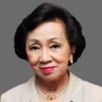
Former Foreign Affairs Minister of the Philippines
The first woman career diplomat to be appointed Minister of Foreign Affairs in ASEAN and in Asia, Delia Domingo-Albert’s forty years’ distinguished career in the Foreign Ministry of the Philippines includes such high-level positions as Director General of the ASEAN National Secretariat, Undersecretary for International Economic Relations and Ambassador to Australia and Germany. She was awarded the Knight Commander’s Cross of the Order of Merit of Germany for her efforts in promoting Filipino-German but also ASEAN-EU relations, and is currently a Senior Advisor to SGV Ernst & Young Philippines.

Director for Asia and Latin America at the European Commission Directorate General for Trade
In her current position, Helena König leads European effort to boost trade relations with ASEAN, with bilateral trade accounting to more than €240 billion in 2015. She is responsible for the negotiations of the trade agreements with the Philippines, Indonesia and Malaysia and was central in the finalisation of the EU-Vietnam FTA. She has worked on EU-Asia since 1997, previously serving as Head of Unit for trade relations with South and Southeast Asia, Australia and New Zealand and as Deputy Head of Unit for Southeast Asia in the Directorate General for External Relations, where she worked on the political aspects of EU relations with the ASEAN countries.

Professor Emeritus of International Political Economy at IMD
Jean-Pierre Lehmann is a leading expert on globalisation, global governance, trade and development, the role of business in reduction of poverty and inequality and the socio-economic, cultural, and business dynamics of Asia. He is currently Professor Emeritus at IMD, a top-ranked business school in Switzerland, specialising in corporate leadership development, and is also Visiting Professor at the Faculty of Business and Economics of Hong Kong University. He is a frequent contributor in numerous journals and online publications including Project Syndicate, the Globalist, South China Morning Post or Forbes.
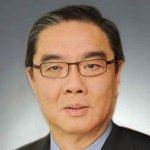
Executive Deputy Chairman of the S. Rajaratnam School of International Studies and Secretary General of the Association of Southeast Asian Nations (2003-2007)
As Secretary General of the ASEAN, Ong Keng Yong campaigned for ASEAN’s increased regional integration. He led the ASEAN Secretariat to facilitate the early adoption of the ASEAN Economic Community (AEC) Blueprint in 2007, which laid the foundation for the establishment of the AEC in 2015. Ambassador Ong currently heads the S. Rajaratnam School of International Studies at the Nanyang Technological University of Singapore, one of the leading research institutions in international affairs in the Asia-Pacific. He is concurrently Ambassador-at-Large at the Singapore Ministry of Foreign Affairs, non-resident High Commissioner to Pakistan and non-resident Ambassador to Iran.
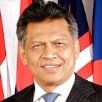
Secretary General of the Association of Southeast Asian Nations (2008-2012)
Surin Pitsuwan, one of Asia’s best-known and most influential thinkers, led ASEAN from 2008 to 2012. During his time as Secretary General of ASEAN, he was tasked with implementing the ASEAN Charter and preparing the region for entry into the ASEAN Economic Community in 2015. His tenure saw the rise of the regional organisation into an important global player in international affairs. He also served as Thailand’s Foreign Minister from 1997 to 2001, during which time he played a major role in restoring peace in East Timor. He is currently the Chair of the International IDEA Board of Advisors.
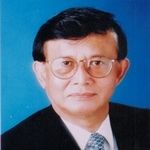
Member of the Board of Trustees of the Centre for Strategic and International Studies Foundation, Indonesia
With more than 35 years of experience in the Ministry of Foreign Affairs of Indonesia, Wiryono Sastrohandoyo has represented Indonesia in several European countries and international organisations, including as Ambassador to France and Permanent Representative to the United Nations Office in Vienna and International Atomic Energy Agency. A leading mediator and peacemaker in Southeast Asia, he was Chief Facilitator for the signature of the ceasefire between the Government of Philippines and the Moro National Liberation Front (MNLF) and led the negotiations with the Aceh Freedom Movement for the government of Indonesia. He is a member of the ASEAN Regional Forum Expert and Eminent Persons Group.
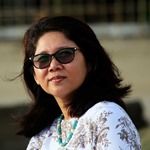
Surgeon, writer, human rights activist and former prisoner of conscience, Myanmar
Ma Thida is a leading intellectual whose writings deal with her country’s political situation. In 1993, she was sentenced to prison for 20 years for “endangering public peace, having contact with illegal organisations, and distributing unlawful literature”. She was released in 1999, partly due to international pressure from organisations like PEN International, of which she is now a board member. Her books include ‘The Roadmap’, a fictional story based on events in Burmese politics from 1988 to 2009 and ‘Prisoner of Conscience’, a memoir about her political imprisonment. She has won several international human rights awards, including the Reebok Human Rights Award, the PEN/Barbara Goldsmith Freedom to Write Award, the Freedom of Speech Award and the Disturbing the Peace; Courageous Writer at Risk Award.
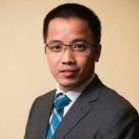
Director-General of the Legal Department at the Vietnam Chamber of Commerce and Industry (VCCI)
Dau Anh Tuan is a key expert on the development of the private sector and foreign investment in Vietnam. As Director-General of the Legal Department of VCCI, the largest national association in Vietnam, he plays a leading role in advocating for the interest of private sector business and foreign enterprises in Vietnam, liaising between the business community and the Vietnamese government on international trade and business-related issues. In 2013, he was selected as an Eisenhower Fellow, a global network of leaders pursuing concrete projects to promote peace and prosperity.

Senior Advisor on ASEAN and Human Rights at the Human Rights Working Group, Indonesia
Yuyun Wahyuningrum is an Indonesian human rights defender who works closely with the ASEAN Intergovernmental Commission on Human Rights, and advises numerous NGOs in ASEAN including the Human Rights Working Group (HRWG), ASEAN Parliamentarians for Human Rights (APHR), the Southeast Asian Initiatives for Human Rights Governance and Accountability (SIHRA), and Women Voices in ASEAN (WEAVE). She was until January 2017 the Team Leader of the Regional EU-ASEAN Dialogue Instrument on Human Rights Facility (READI HRF), supporting ASEAN’s integration agenda. She is currently a PhD Researcher at Erasmus University Rotterdam, where her research deals with human rights norms with a particular focus on ASEAN as a site of contestation.

Managing Director for Asia and Pacific at the European External Action Service (EEAS)
With more than twenty years’ experience in the EU’s external relations and trade policy, Gunnar Wiegand has previously served as Spokesman for External Relations to Commissioner Chris Patten; Head of Unit for Relations with the United States and Canada at the European Commission’s External Relations Directorate-General; and Deputy Managing Director for Europe and Central Asia at the EEAS, during which time he was the EU’s Chief Negotiator for the Association Agreements with Moldova, Georgia and Armenia, as well as the Enhanced Partnership and Cooperation Agreement with Kazakhstan. Wiegand also acted as the EU’s Chief Negotiator for the new EU-Japan Strategic Partnership Agreement.
Partners
Coorganized with

Activities
Europe-China Forum 2025
Next event In person & livestreamed

- Area of Expertise
- Global Europe
Trading tariffs and trade as a geopolitical tool
Past event

- Area of Expertise
- Global Europe
From aid to investment: shaping Europe's global role in a changing world
Past event Online

- Area of Expertise
- Global Europe
Future Africa-Europe High-Level Forum
Past event IN PERSON & ONLINE

- Area of Expertise
- Global Europe
Trump's betrayal of the world's poor is Europe's opportunity
- Category
- Frankly Speaking
- Author
- By Giles Merritt
Policy Voices | #Throwback: UNRWA’s Jonathan Fowler on Gaza: “It is a…
- Category
- Podcast
- Area of Expertise
- Global Europe
DRIVE Impact Initiative final report
- Category
- Event Reports
- Area of Expertise
- Global Europe
Europe’s blackouts call for a NATO-level response
- Category
- #CriticalThinking
- Author
- By Maurizio Geri

- Area of Expertise
- Global Europe

- Area of Expertise
- Global Europe

- Area of Expertise
- Global Europe

- Area of Expertise
- Democracy
Continue
the debate on
- Debating Europe
